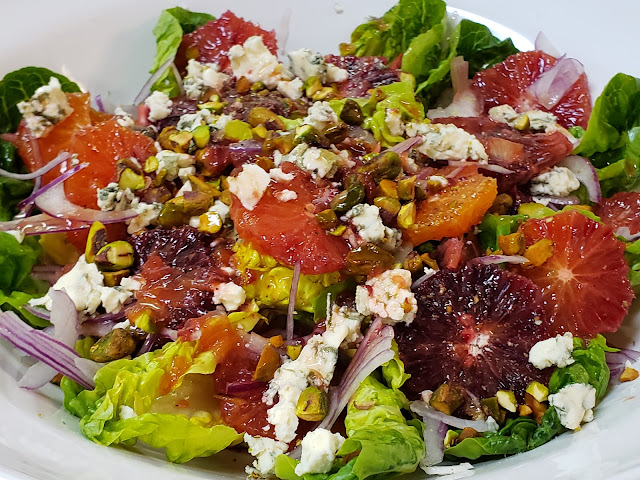Oily Vegetables & Devilled Eggs
Gotcha! Curious, aren't you? What a ridiculous title for a blog post and what a strange combination! But, read on. It's not as strange as you're thinking.
 |
| Traditional Greek and Traditional Southern Combo Brunch |
You may have read a couple of earlier posts that reference my GrecoSoCo recipes. Greek Southern Cooking is GrecoSoCo, my spin on traditional recipes of my husband's and my childhood foods. That's what this brunch was all about, and (except for boiling and peeling the eggs) it came together in around thirty minutes, once the vegetables were prepped for cooking. Scroll down for the names and recipes of the dishes for my easy and delicious GrecoSoCo brunch.
Devilled eggs make repeat appearances at our kitchen table. Everyone loves them, and I've found that they're best when I KISS them. Keep It Simple Stupid is the best way in my kitchen. I follow a basic four-ingredient recipe, and it's consistently delicious. My recipe is in an older post. You can click this link and go directly to that post without any searching. Note: I no longer use vinegar.
 |
| My rustic preparation for devilled eggs. I don't pipe on the filling. I just pile it on with a spoon. Lazy or easy? |
Cucumbers and red onions come together in both Greek and Southern recipes. This is my take on a Red Onion and Cucumber Salad.
6 small cucumbers, peeled and sliced
1/4 cup sliced red onion (use more or less depending on your taste)
salt to taste
1/2 teaspoon dry oregano
2 tablespoons red wine vinegar
4-6 tablespoons extra-virgin olive oil
Everything goes into a bowl and gets tossed. I usually eyeball the vinegar and olive oil.
 |
| Fried eggplant finished with cheese is a wonderful dish on its own. If you're not intolerant of the texture of eggplant. |
Fried eggplant makes me salivate. The simplest preparation sweetens the eggplant and makes it a star in my mind.
1 large eggplant (washed and ends cut off)
salt and pepper to taste
all-purpose flour
olive oil to fry
Cut the eggplant lengthwise into half-inch slices. Season with salt and pepper. Dredge in flour. Heat a cast-iron or stainless steel pan. When the pan is hot, pour in enough olive oil to coat the bottom of the entire pan. Dust off excess flour from the eggplant and fry two or three slices at a time. Heat should be on medium-high. When eggplant is golden-brown on both sides, transfer to a towel to blot off excess oil, and then place on a serving platter. Sprinkle liberally with freshly grated Parmesan or Romano.
Greek stewed okra is a favorite. Bamies Latheres translates as Oily Okra. This is my reference in the title. So, too much oil is a bad thing, right? Well, not so in the Greek version of the Mediterranean Diet. The Greek Heritage Kitchen boasts hundreds of stews, many of which are for vegetables, and the recipes call for a large amount of good olive oil. The Greeks have lived long and healthy lives for many, many years, so I'm thinking that there's something to using too much olive oil. I tell my cooking coaching students that it's a medicinal quantity that we're using.
2-3 lbs okra, washed and trimmed of the woody stalk end
1 large sweet one like Vidalia, chopped
1 large clove garlic, chopped
1/2 cup olive oil
salt and pepper to taste
1 (14.5 oz) can finely diced tomatoes
1 1/2 cups water (I just fill the empty tomato can with water. It's roughly the same as 1 1/2 cups)
Heat a pan over medium-high heat. Stir in the onions and garlic. Once the onion has softened, add the okra, tomatoes, salt, pepper and water. Bring to a boil, cover and cook about 30 minutes or until okra is tender. If there's too much liquid in the pan, remove the lid and continue to cook over high heat until it's reduced. Chopped parsley is a fresh touch to stir in at the end. Parsley is loaded with vitamin C, so be as generous as you wish. One tablespoon gives you 8% of the recommended daily allowance.
We enjoy this dish all by itself with good bread to dip into the sauce and a generous slice of feta cheese on the side.
And the little pickled leaves? What are they? Known as Sea Fennel, it's a wild plant typically found along the coast in Greece and pickled for its nutritional and antioxidant properties. Diane Kochilas has a short post about this pickled plant here. I buy a small jar via a Greek shop on Amazon.com








Comments
Post a Comment